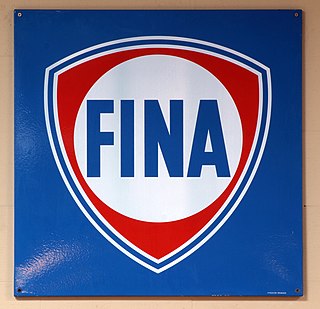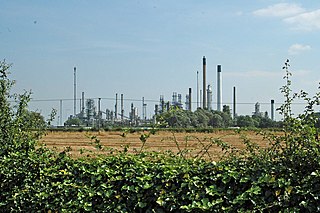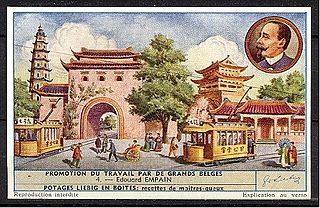Related Research Articles

Petrofina was a Belgian oil company. It merged with Total in 1999 to form TotalFina, which after subsequent mergers has changed its name back to Total. In the United States, Fina's former refining and marketing operations are now owned by Delek US.

Elf Aquitaine is a French brand of oils and other motor products for automobiles and trucks. Elf is a former petroleum company which merged with TotalFina to form "TotalFinaElf". The new company changed its name to Total in 2003 and TotalEnergies in 2021. Elf has been as a major brand of TotalEnergies since then.

TotalEnergies SE is a French multinational integrated energy and petroleum company founded in 1924 and is one of the seven supermajor oil companies. Its businesses cover the entire oil and gas chain, from crude oil and natural gas exploration and production to power generation, transportation, refining, petroleum product marketing, and international crude oil and product trading. TotalEnergies is also a large-scale chemicals manufacturer.

Agip is an Italian automotive gasoline, diesel, LPG, lubricants, fuel oil, and bitumen retailer established in 1926. It has been a subsidiary of the multinational petroleum company Eni since 2003, when Eni acquired Agip Petroli S.p.A., creating the Refining and Marketing Division (R&M).

Kochi Refinery Limited (KRL) is a crude oil refinery in the city of Kochi in Kerala, India. It is the largest public sector refinery in India with a production capacity of 15.5 million tonnes per year. Formerly known as Cochin Refineries Limited and later renamed as Kochi Refineries Limited, it was acquired by Bharat Petroleum Corporation Limited in the year 2006. The refinery is situated at Ambalamugal, around 12 km (7.5 mi) east of the city centre.

National Iranian Oil Refining and Distribution Company (NIORDC) is part of the Ministry of Petroleum of Iran. NIORDC was established on 8 March 1991 and undertook to perform all operations relating to refining and distribution of oil products.

Naftna Industrija Srbije is a Serbian multinational oil and gas company with headquarters in NIS building, Novi Sad, Serbia. NIS is one of the most profitable companies in Serbia and one of the largest domestic exporters. It employs around 11,000 people in Serbia and the region. As of May 2022, Gazprom Neft is the largest shareholder with 50% of NIS shares, followed by 29.87% owned by the Government of Serbia, 5% owned by Gazprom and rest by minority shareholders.

The Humber Refinery is a British oil refinery in South Killingholme, North Lincolnshire. It is situated south of the railway line next to the A160; Total's Lindsey Oil Refinery is north of the railway line.
The Iraq National Oil Company (INOC) was founded in 1966 by the Iraqi government. It was empowered to operate all aspects of the oil industry in Iraq except for refining which was already being run by the Oil Refineries Administration (1952) and local distribution which was also already under government control.

Marsden Point Oil Refinery was a 96,000 BPD refinery located at Marsden Point, Whangarei, Northland, New Zealand. It was the only oil refinery in New Zealand, and is operated by Refining NZ. The point was named after Samuel Marsden. The regional survey map shows it was called Marsden Point in 1907.

Murco is an oil refining company based in the United Kingdom. It was set up by Murphy Oil Corporation in 1960. The company owns a forecourt-based chain of convenience stores of Costcutter. Murco purchased a 30% stake in Amoco’s Milford Haven Refinery in 1981, and the remaining 70% in 2007.

Grangemouth Refinery is a mature oil refinery complex located on the Firth of Forth in Grangemouth, Scotland, currently operated by Petroineos.
Hector Carlier was a Belgian banker and industrialist who was the son of banker Jean Baptist Ferdinand Carlier and Marie de Roy. He was married with Amelia Goossens and together they had three children. He is one of the founders of the Belgian oil company Petrofina. Petrofina merged with Total of France to form TotalFina and with Elf Aquitaine in 2000 to form TotalFinaElf. The company's current name is Total S.A.

Ceylon Petroleum Corporation, commonly known as CEYPETCO (CPC), is a Sri Lankan oil and gas company. Established in 1962 and wholly owned by the Government of Sri Lanka, it is largest oil company in the Sri Lanka. It was formed in 1961 by nationalisation and expropriation of all private oil companies in Sri Lanka at the time of its formation. It is under the ownership of Ministry of Petroleum Resources Development headquartered in Colombo. It is the largest government owned company in the country, with an operational profit of Rs. 33.9 billion for the financial year 2020.

The Banque de l'Union Parisienne (BUP) was a French investment bank, created in 1904 and merged into Crédit du Nord in 1973.

Cnergyico Pk Limited is a Pakistani petroleum company which is a subsidiary of the Mauritian company Cnergyico Industries Incorporated. The company is vertically integrated across the oil refining and marketing industries, notable for being the only petroleum company in Pakistan to own and operate a crude oil terminal. Cnergyico operates Pakistan’s biggest oil refinery in terms of nameplate capacity, the largest capacity crude oil storage tanks in the country, and a network of petrol pumps.
The petroleum industry in India dates back to 1889 when the first oil deposits in the country were discovered near the town of Digboi in the state of Assam. The natural gas industry in India began in the 1960s with the discovery of gas fields in Assam and Maharashtra. As on 31 March 2018, India had estimated crude oil reserves of 594.49 million metric tonnes (Mt) and natural gas reserves of 1339.57 billion cubic metres of natural gas (BCM).
Heysham oil refinery was located between Heysham and Middleton on the Heysham peninsula, Lancashire. It was built during the Second World War to produce high octane fuel for combat aircraft. It was later adapted to refine crude oil with a processing capacity of two million tonnes per year and was in operation from 1948 to 1976. It worked in conjunction with a chemical plant which produced ammonium nitrate fertilizer and other products, using feedstocks from the refinery.

The Feyzin Refinery is an oil refinery in south-east France, one of seven oil refineries in France.

The Empain group was a loose grouping of companies founded by Édouard Empain (1852–1929) of Belgium and controlled by the Empain family. From 1881 until merging with Schneider & Cie in 1969, the companies engaged in a broad range of activities including tramways, railways, electricity generation, construction and mining. The main areas of activity were Belgium and France, but the group also pursued opportunities in Russia, Egypt, China and elsewhere, and played a large role in the development of the eastern Belgian Congo.